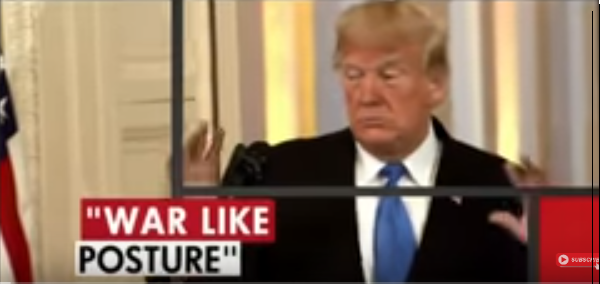War like posture and other metaphors
[ by Charles Cameron — continuing the search, plus mckibben & a touch of dylan as a sunday surprise ]
.
First a chyron, based on Trump’s words:
Fascinating article: The Dawn of the Intra-Family Political Attack Ad
In August, Glosser published an essay in Politico magazine chiding his nephew by sharing the family’s own immigration story as Jews who fled the shtetls of Eastern Europe. “I have watched with dismay and increasing horror as my nephew,” Glosser wrote, “an educated man who is well aware of his heritage, has become the architect of immigration policies that repudiate the very foundation of our family’s life in this country.”
Is House of Cards a poem, then?
Doug Stamper is the dog.
In the opening moments of Netflix’s House of Cards premiere episode from 2013, Frank Underwood (Kevin Spacey) hunched over a dog that’d been injured by a car. “There are two kinds of pain,” he said into the camera. “The sort of pain that makes you strong, or useless pain, the sort of pain that’s only suffering. I have no patience for useless things. Moments like this require someone who will act, who will do the unpleasant thing, the necessary thing.”
He then broke the dog’s neck. “There,” he said. “No more pain.”
In the final moments of the final episode of House of Cards—which occurs in a truncated season made after Spacey left the show due to allegations of sexual misconduct—the president, Claire Hale Underwood (Robin Wright), cradles her dead husband’s henchman, Doug Stamper (Michael Kelly), in her lap. She has just stabbed him in the belly with a letter opener after he nearly slit her throat with it. Underwood puts her hand over his mouth and nose and tells him that everything’s going to be okay. His eyes close. “There, no more pain,” she says. Her eyes flick toward the camera. The credits roll.
Some sort of rhyming is going on here, clearly, but does the poem mean anything?
That “rhyme” is a DoubleQuote, really — a thought-rhyme if you like, and on a technical film-making sense a clever twist to end on. Not so much a synchronicity or coincidence, more a twist of authorial fate.
**
Twists of fate, eh? And tangled up in blue? Here are two recent Dylan pieces to note:
New Yorker, Bob Dylan’s First Day with “Tangled Up in Blue” New Yorker, Bob Dylan’s Masterpiece Is Still Hard to Find
**
Bill McKibben, with a s game / play metaphor that derives its strength from the topic, not from the metaphoric play:
In the face of our environmental deterioration, it’s now reasonable to ask whether the human game has begun to falter—perhaps even to play itself out.
That’s from How Extreme Weather Is Shrinking the Planet — see also THE END OF NATURE.
Early and late, McKibben has been one of the voices crying that the wildness is shronking — from within the shrinking wilderness..
Wilderness / wildness yes, that’s deliberate..
**
& by way of a Sunday surprise, here’s some extraordinary music for whenever you need extraordinary, need music — twists of tangled blue fate included:




November 20th, 2018 at 1:25 am
My favorite song on that album is ‘Lily, Rosemary and the Jack of Hearts’. Dylan was re-imagining his souring marriage as a Western soap opera. Replete with dashing heroes, dastardly villians, damsels in distress, all framed by a simultaneous bank heist. It’s no wonder it didn’t lend itself well to a stripped down acoustic recording.